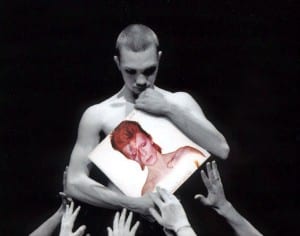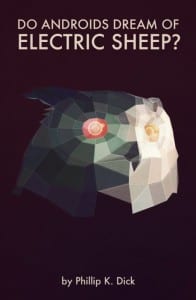
Promotional Photo for “From Ibiza to the Norfolk Broads” (Berry, 2013)
Last night, I watched a solo performance called “From Ibiza to the Norfolk Broads” at the Lincoln Drill Hall. The focus of this performance was around one man’s obsession with David Bowie, his eating disorder, and the absence of his father. It was peculiar, but very well done, and rather moving. What I felt was important about this play was that it didn’t feel as if it was capitalizing on Bowie’s death, which I didn’t think it did. In fact, whilst the story revolved around a young man following Bowie’s life through locations, it focussed on Bowie very little. I found this to be interesting, and something I would certainly watch again. I also liked the set, very much. It was a very small performance space, with scaffolds – covered in what looked to be cellophane – encircling the space, and some blocks. Lit from behind, the cellophane on the scaffold made a very interesting image, the different strips of plastic creating an almost fractured look to any images projected onto it. I will certainly consider doing something similar, if possible.

Book cover of “Do Androids Dream of Electric Sheep” (Skjefstad, 2016)
This week, I am decidedly focussed on Science Fiction, with its escapist possibilities, and abstract, boundless visuals. However, my focus is not on escapism, nor am I interested in the endless possibilities for human progress outside of Earth. What I’m namely focussed on is Do Androids Dream of Electric Sheep, a dystopic, noir sci-fi novel by Phillip K Dick (First Published in 1968), and Blade Runner, the film adaptation of this novel.
Firstly, the visuals of Blade Runner fascinate me. The cityscape of rough, urban environment, depicted against the enormous advertisements that life will be better if you buy this product creates a very bleak, but believable depiction of what our future could be. I feel that this feeling of a vast, uncaring world, trying to tell you that the only path to happiness is buying into capitalism, can be achieved similarly with costume, lighting, minimal set, and projections. This is something I would like to explore in rehearsal.
Whilst these two sources are entirely different in their approach to the world that these stories are set in, and the stories themselves, I am fascinated by their shared questions of existentialism. What makes us human? What’s to say that an advanced artificial intelligence could not develop the capability to process emotions? These questions are explored in more depth in the novel, which is what attracts me to exploring its possibilities. In Do Androids Dream of Electric Sheep – a title I will shorten to DADES – the earth is little more than a nuclear dustball after a nuclear war, with people who have been rendered infertile, by its radioactive properties, and those with a lower than average IQ being kept on Earth, whilst the rich and the fertile are shipped off to humankind’s first off-world colony, Mars. This premise is not an atypical concept to science fiction novels. Some would even argue that is considerably mundane by today’s standards, given our abundance of dystopic novels set on similar versions of Earth – most of which are comparable to The Wasteland by T.S Eliot – but it is not this Earth that attracted me to the story.
A large part of what attracted me to this novel, apart from the Androids (Something I will come to shortly), was the premise of the so-called “Penfield Mood Organs”. The Mood Organs control the moods and emotions of the people who own them, even having a setting for “A Desire to watch Television, no matter what is on”. It is there to distract those who can afford the luxury to avoid feeling, and the existential dread that comes with living on a dead world, which Decker’s wife, Iran, notes:
“My first reaction consisted of being grateful that we could afford a Penfield mood organ. But then I realised how unhealthy it was, sensing the absence of life, not just in this buiding but everywhere, and not reacting – do you see? I guess you don’t. But that used to be considered a sign of mental illness; they called it “absence of appropriate affect.” So I left the TV sound off and I sat down at my mood organ and I experimented. And I finally found a setting for despair.’ Her dark, pert face showed satisfaction, as if she had achieved something of worth. ‘So I put it in my schedule for twice a month; I think that’s a reasonable amount of time to feel hopeless about everything.” (Dick, 2010, p.3)
It is this categorisation of emotion that fascinates me so. In a world where it is thought that androids are unable to feel, or even simulate feeling – and, if they come close to doing so, they are ‘retired’ – that humankind has to resort to setting their emotion on a dial, like a setting on a computer, as if the actual act of feeling is far too much work for people to do, and yet the androids, emotionless slaves, are shunned and killed for learning to do so. I find this to be a fascinating concept and one that is poignant to masculinity. Men are consistently told to move away from feeling and moving towards a cold exterior, not letting anyone know that beneath it, there is a human being. This isolation of feeling is what I am drawn to in my performance, the slavery to a culture of feeling nothing. To my mind, emotions are what makes us human. The complicated, messy emotions that we try and bury. In my performance, I would like to explore what else makes us human. This is something else that Blade Runner, the film adaption of DADES, explores.
Another part of these two sources that interests me is the androids themselves. They are the pinnacle of human artifice after the creators designed them to look, move, smell and sound like humans. These androids feature all of the traits of a human being, even our capability for feeling, and mortality. The concept of mortality is something that Blade Runner focusses on, as well as the concept of empathy. Even before I had seen the film in full, I had seen the scene of Roy Batty’s death, and it stuck in my mind for years afterward, it was poignant to me.
This entire speech is about understanding & empathy, something that Batty feels that Decker lacks after he has gunned down all of his fellow replicants, but still, Batty saves Decker’s life, as he faces his own mortality. This empathy is something that does not seem to be innate in the humans we encounter in Blade Runner and something that Decker seems to have to adapt and learn to. It makes Batty feel more human than half of the human beings that Decker encounters throughout the events of the film, despite him being a murderer, and something of a madman. To me, Blade Runner is an exploration into what makes us human, and this exploration is something I would like to be able to explore in my Solo Performance. Ranging from the vast emotional landscape humans cut themselves out of in DADES, to the lack of empathy in humans and mortality in Blade Runner. I intend to explore the possibilities of just how I intend to represent that in rehearsal, and in creating my performance.
Bibliography
Berry, A. (2013) Bowie on stage: From Ibiza to the Norfolk Broads – god is in the TV. God Is In The TV. Available from http://www.godisinthetvzine.co.uk/2013/03/25/bowie-on-stage-from-ibiza-to-the-norfolk-broads/ [accessed 8 February 2017].
Dick, P.K. (2010) Do androids dream of electric sheep? London: Gollancz.
Guillermo St (Youtube) (2012) Blade runner – final scene, “tears in rain” monologue (HD). Available from https://youtu.be/NoAzpa1x7jU.
Skjefstad, V. (2016) “Do Androids Dream of Electric Sheep?” by Philip K. Dick. Available from https://www.vegard.net/archives/13027/ [accessed 8 February 2017].
Citations, Quotes & Annotations
Berry, A. (2013) Bowie on stage: From Ibiza to the Norfolk Broads – god is in the TV. God Is In The TV. Available from http://www.godisinthetvzine.co.uk/2013/03/25/bowie-on-stage-from-ibiza-to-the-norfolk-broads/ [accessed 8 February 2017].
(Berry, 2013)
Dick, P.K. (2010) Do androids dream of electric sheep? London: Gollancz.
Guillermo St (Youtube) (2012) Blade runner – final scene, “tears in rain” monologue (HD). Available from https://youtu.be/NoAzpa1x7jU.
(Guillermo St (Youtube), 2012)
Skjefstad, V. (2016) “Do Androids Dream of Electric Sheep?” by Philip K. Dick. Available from https://www.vegard.net/archives/13027/ [accessed 8 February 2017].
(Skjefstad, 2016)
—


